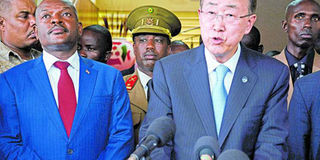Nkurunziza, opposition to meet to end political crisis

Burundian President Pierre Nkurunziza (left) stands next to UN Secretary General Ban Ki Moon during a press conference on February 23, 2016 in Bujumbura. Five African leaders are to visit Burundi this week to push for progress in stalled efforts to end the country's 10-month-old crisis that has left more than 400 dead, the South African government said on February 23, 2016. PHOTO | AFP
What you need to know:
- Burundi President Pierre Nkurunziza and the opposition agreed on Tuesday to hold talks to end a 10-month-old political crisis.
- Burundi’s crisis was triggered by Nkurunziza’s controversial decision in April last year to run for a third term which he went on to win in a July election.
- Mr Nkurunziza said he had appealed to Mr Ban to help end Rwandan support for Burundian rebels alleged by Burundian authorities and UN investigators.
BUJUMBURA, Monday
Burundi President Pierre Nkurunziza and the opposition agreed on Tuesday to hold talks to end a 10-month-old political crisis, UN Secretary General Ban Ki-moon said on Tuesday.
After meeting with Mr Nkurunziza as well as government and opposition politicians, Mr Ban said that all sides had agreed to “inclusive dialogue” and that the president “confirmed, that he would engage in political dialogue.”
“Burundi’s political leaders must be ready to summon the courage and the confidence that will make a credible political process possible,” Mr Ban said.
Mr Ban met with both government and opposition politicians on Monday night before holding talks with Mr Nkurunziza on Tuesday morning. It remains unclear which of his opponents Nkurunziza will be willing to negotiate with as some are in exile, some jailed and some have taken up arms.
“This dialogue concerns all Burundians, except those engaged in acts of destabilisation,” Nkurunziza said Tuesday, hours after overnight grenade attacks in several city neighbourhoods left a dozen injured, according to police.
Burundi’s crisis was triggered by Nkurunziza’s controversial decision in April last year to run for a third term which he went on to win in a July election.
VIOLENT ATTACKS
Over 400 people have been killed, more than 240,000 have left the country and violent attacks have become a daily routine in the months since.
Mr Ban’s visit is aimed at reviving stalled efforts to end the crisis and comes after the Burundi government appeared to soften its position towards opponents by agreeing to receive a delegation of African heads of state, expected later this week.
It also cancelled international arrest warrants against several exiled opposition leaders.
Mr Nkurunziza said he had appealed to Mr Ban to help end Rwandan support for Burundian rebels alleged by Burundian authorities and UN investigators.
“We also discussed regional problems and we explained how Rwanda is trying to destabilise us,” Nkurunziza said.
“We told (Ban) that we had evidence and we asked for UN intervention to push for Rwanda to give it up, so that Burundians and Rwandans can live in harmony as in the past.”
Meanwhile, five African leaders are to visit Burundi this week to push for progress in stalled efforts to end the crisis, the South African government said on Tuesday.
The African Union delegation, headed by South African President Jacob Zuma, will arrive for the two-day trip to Bujumbura on Thursday.
POLITICAL DIALOGUE
Also on the visit are President Mohamed Ould Abdel Aziz of Mauritania, President Macky Sall of Senegal, President Ali Bongo Ondimba of Gabon and Prime Minister Hailemariam Desalegn of Ethiopia.
“The African Union summit (in January) decided that, regarding Burundi, an inclusive political dialogue must be supported,” the South African government said in a statement.
It added that the delegation would “meet with the highest authorities of the Republic of Burundi, as well as with other Burundian stakeholders, to hold consultations on the inclusive inter-Burundian dialogue”.
At the summit in Addis Ababa, African leaders declined to authorise a proposed peacekeeping force to stem the violence after vehement opposition from the government in Bujumbura.
The UN has warned Burundi risks a repeat of the 1993-2005 civil war in which an estimated 300,000 people died.
The government of neighbouring Rwanda, which is sheltering some 75,000 Burundians, meanwhile confirmed it is planning to relocate the refugees to other countries, but insisted it would respect its obligations under international law.
Rwanda’s relocation plan comes amid accusations that Kigali is meddling in Burundi’s affairs.
Burundi has repeatedly accused Rwanda of backing rebels intent on overthrowing the government in Bujumbura. Kigali has fiercely denied the accusations.





